I’ve decided to start another series on this blog. Just like with the interviews with people who love speculative fiction that I’ll begin publishing here next week, Hopeful Science Fiction, film reviews, Questions from the Search Engines, and Blogging Advice, this series won’t be updated on a specific schedule. Once I’ve come up with several similar titles to recommend to people who enjoyed a certain book, that post will be added to the queue.
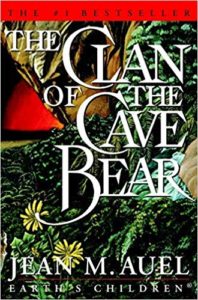 The Clan of the Cave Bear is a prehistoric novel written by Jean M. Auel in 1980 about an orphaned human girl named Ayla who was raised by Neanderthals. It has four sequels about Ayla’s life as an adult.
The Clan of the Cave Bear is a prehistoric novel written by Jean M. Auel in 1980 about an orphaned human girl named Ayla who was raised by Neanderthals. It has four sequels about Ayla’s life as an adult.
Part of the reason why I picked this specific tale to start this series off with is because I’ve been getting a spike of visitors coming to this site looking for information about Auel, her characters, and whether there is going to be a TV show or movie made about the Earth’s Children books.
No, it doesn’t look like there’s anything in the works. I’ll be the first to shout it from the rooftops if that ever changes! In the meantime, why not talk about something I enjoyed quite a bit?
The Clan of the Cave Bear is one of those stories that I’ve returned to over and over again. The plot is an intriguing blend of adventure, romance, mystery, and even a touch bit of the paranormal genre at times.
Life wasn’t exactly easy for hunter-gatherers 30,000 years ago, so there were also plenty of subplots about gathering food, making weapons, preserving medicinal herbs, and doing everything else necessary to survive the cold, long winters of an ice age.
I’ve spent years on the lookout for books that are comparable to this one and its sequels. The following list is the cream of the crop of everything I’ve read so far about Neanderthals and how they might have interacted with Homo sapiens tens of thousands of years ago or in modern times.
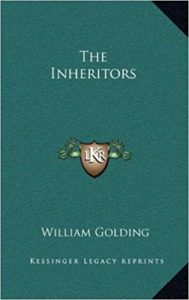
The Inheritors by William Golding
This was the first well-written book I discovered when I went to the library as a young teen in hopes of finding more storytellers like Jean M. Auel who had clearly done their research about life in the prehistoric era.
It was fascinating to see how Mr. Golding imagined Neanderthals might have behaved as their culture began to bump up against a stronger one. The Neanderthals in this world were caring, but they had trouble competing in a world where a more intelligent and dangerous type of human was beginning to move into their territory. I’d argue that this twist says just as much about him and the era he lived in as it does about one of the possible reasons why this species might have gone extinct.
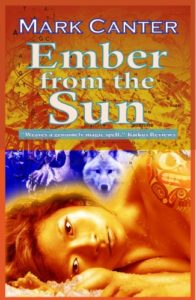
Ember from the Sun by Mark Canter
I read this title soon after finding The Inheritors, and it’s something I’ve been recommending to likeminded readers for many years now. It’s by far the most science-fiction oriented part of this list because of how much time the narrator spent setting up the storyline and explaining why the things he imagined could possibly happen with the use of science instead of magic to explain them.
In short, the main character was a scientist who found the body of a frozen Neanderthal woman that was so well-preserved he actually found a viable embryo in her womb. (Yes, there was a somewhat-scientific reason why this was possible in this universe, but I can’t tell you specifics about that scene without revealing an important part of the plot).
He implanted that embryo into a human volunteer, named the resulting baby Ember, and raised her as his own. As she grew up, she began to explore her unusual past. She had many of the same questions that people who are transracially adopted have about their identity, and those questions lead to some very interesting developments in the plot that I still mull over to this day.
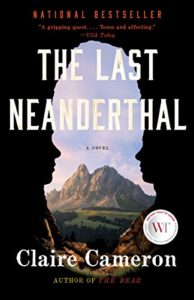
The Last Neanderthal by Claire Cameron
The title of this one gives away its subject matter. We know that eventually all of the Neanderthals died out (or interbred with a much larger group of humans until their genes almost completely disappeared). There are so many things that bones can’t tell us about an individual or their culture, however!
What was the life of the last obvious Neanderthal like? How were they different from us? I can tell you almost nothing about this protagonist other than the fact that I found her delightful. Everything else I want to say would wander too close to spoiler territory because of how long it took the author to explain some of her character’s most enduring traits.
There is a film by the same name that is currently in the works. I can’t figure out if it’s supposed to be based on this book. Either way, I’m tentatively hoping to review it when it comes out!
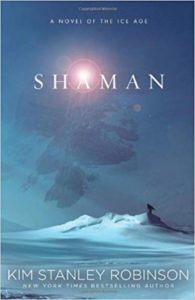
Shaman by Kim Stanley Robinson
One of the things I wish had been different about the Earth’s Children books was how far they eventually strayed away from describing all of the hard work that people needed to do in order to survive in such harsh climates. This novel always stayed true to its setting in that way. Life as a hunter-gatherer is never something that should be romanticized even if there are certain parts of it I wish I could incorporate into my own urban lifestyle!
I also loved the friendships the characters in this tale developed with Neanderthals. They worked together to survive in an unforgiving climate. As much as I respected Mr. Golding’s take on this topic, I’d like to think that the past was a cooperative place.
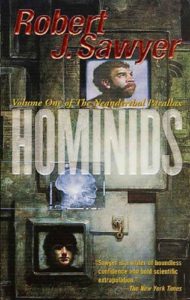
The Neanderthal Parallex trilogy by Robert J. Sawyer
In Hominids, the first book of this series, humans from our Earth meet a modern-day Neanderthal from a parallel universe where their species survived and humans died out tens of thousands of years ago.
The cultural differences between Neanderthals and humans were vast. To give one of the least surprising examples, all of the Neanderthals in this universe are bisexual and have two spouses, one man and one woman. It was fascinating to see how these two worlds collided once the characters realized just how many assumptions they made about life didn’t fit the other society in any way.
I can’t believe no one has turned this into a TV series yet. Robert J. Sawyer has written dozens of worthwhile books, but this world in particular really needs to be shared with a wider audience. It was so thought provoking.
Respond
If any of you have recommendations for other prehistoric tales or a request for a book I should feature next in this series, do speak up. I’m always open to suggestions.

Ooooh this sounds like a good series and collection! I’ll have to look into it!
Thank you. I hope you like these books if or when you read them. 🙂
What a great post! Several of these books look intriguing to me. 🙂
Thank you! I sure thought they were good, and I hope you do as well.
Bernard Cornwell’s Stonehenge is a fascinating speculation about a time and place we know almost nothing about. You can’t go wrong with the master storyteller, especially when it’s such a fascinating theme!
I feel like we might have talked about that book before? My library does have a copy of it, so I’m going to give it a try. It sounds amazing.
I enjoyed Clan of the Cave Bear, the movie with Daryl Hannah didn’t translate well. I read three of the next books and found them interesting, but too long. Too much description and not enough plot. I got tired of descriptions of plants and flowers that over time like she wrote the description down and then pasted it every hundred pages. By the third book for the first time in my life I skipped the sex description and it was again repeated ad nauseum. The other books you’ve mentioned I’ll take a look at.
Yeah, I understand your criticisms. Those were things I weren’t a huge fan of either even though I liked the main plot quite a bit.
I hope you like my other suggestions!
Dear Lydia thanks for the recommendations and yes Jean’s ad nauseum of description was a bit much but with most books I have learned to skim over sections that don’t contribute to the story and that happens a lot. On the upside this type of over descriptive narrative allows you to skim over the unimportant while mulling over what you have read kinda like accidental genius and yes the sex is kinda well meh but I mean really almost all modern literotica is dominance or power and rarely ever worth more than a few minutes of our time but overall I really liked it and it definitely inspired a lot of imagination
Thank you, Robert!
Circles of Stone (first book in The Mother Series) by Joan Dahr Lambert was good too!
Also Born in a Treacherous Time
Ooh, thank you! I’ll look them up.
Im reading Earths Children Series for the second time. First time I was 17. Im now 50. MY what a difference 33 years makes in reading them. I see SO much I missed then. Of course at 17 I had no life experience. And way different interest in them. Yes the over descriptions of flowers and herbs and such are a bit much but they still add so much to the vividness of the surroundings and experience. Im currently on The Plains of Passage and Im sad that I only have two left. So Im looking for books that are similar because Im not ready to give them up anytime soon. I saw there is a 7th book, by Andy Black called The Sacred Mountain..I wondered if anyone had read it and what they thought?? Its supposedly a continuation 10 years after the last book?
I will totally check out this list tho Thank you. So glad I found your blog.
You’re welcome, Shanda. Do you have a blog? I’d love to check it out if you do.
I haven’t had a chance to read The Sacred Mountain yet, but I’ve heard nothing but glowing reviews of it. I truly hope you like it.
Are you aware of http://ecfans.com? There is more fan fiction about this series there if that’s something you like (as well as many years of discussions about the characters, setting, etc).
Lydias – thanks for posting the other books. As to other readings, there is Michelle Paver’s Chronicles of Darkness series (for adolescents) that deals w/the period just after the Neanderthals. My wife and I enjoyed them after our daughter read them. The series is entertaining, well-researched and written, and has a compelling story line.
You’re welcome. I’m looking up the Chronicles of Darkness series now. It sounds awesome, so thank you for it.
I’ve read the Earth’s Children series twice now and will probably do so again. Both as literature and as paleo-anthropology, it definitely has problems, but I keep coming back to it because there’s really so little else of value in the realm of prehistoric fiction. 95%+ of human history is PREhistory, and yet there are almost no good novels that explore that world.
Kim Stanley Robinson is my favorite SF writer, and when I first stumbled on Shaman I was overjoyed. It’s a dark book, but very powerful and though-provoking (which describes pretty much everything KSR writes, actually).
I’ve never heard of The Inheritors or The Last Neanderthal before, so I’ll be checking those out soon. Thanks for the thoughtful post.
Thank you for your kind words, Stu, and you’re welcome.
You’re right that there are almost no good novels in that genre. I wish more writers would pick it as their setting! I’m always on the lookout for that sort of stuff.
I hope you like The Inheritors and Shaman.
Thank you so much for this list. Really looking forward to reading these
You’re welcome. Happy reading!
Oh wow this is just the list I want! Thank you so much. . What would you recommend first? I’ve loved the Earths Children series and have read it twice over the years.
You’re welcome! I’d recommend trying Ember from the Sun first. It’s lighthearted and so much fun to read.
So happy you made this! I’ve been looking for more books like The Earth Children Series. I read Sue Harrison’s trilogy, which is Native American really, but I just didn’t enjoy it as much. I’m going to try all of these!
Thank you! I hope you enjoy all of these books.
I wasn’t a huge fan of Sue Harrison’s books either, but to each their own. 🙂